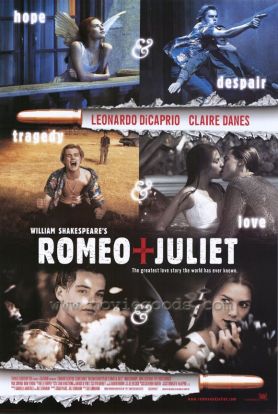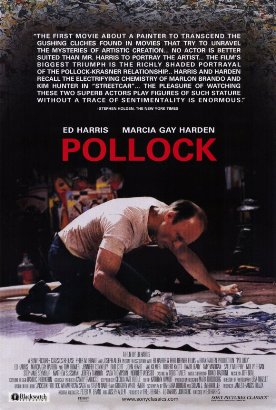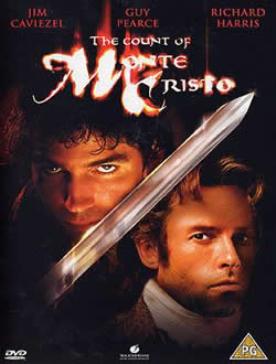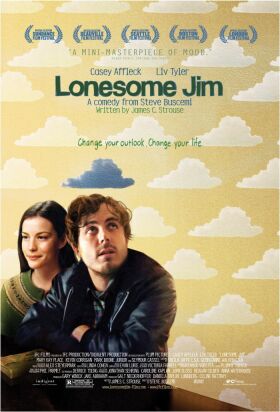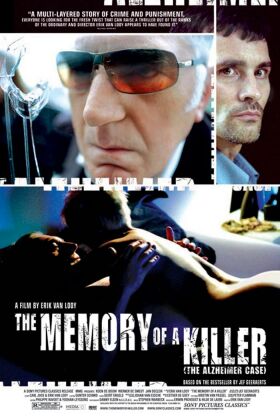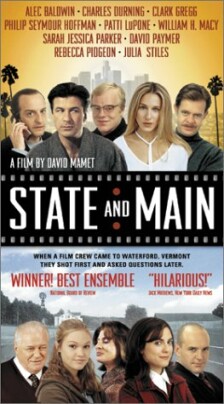William Shakespeare’s Romeo + Juliet
Baz Luhrmann’s Romeo and Juliet is a good example of Shakespeare killed by terminal hipness. It is remarkably clever, and even has some good dramatic ideas. Having Juliet (Claire Danes) wake up just before Romeo (Leonardo DiCaprio) drinks the poison and simply cutting Friar Lawrence (Pete Postlethwaite) out of it is an interesting notion and adds a certain poignancy to the often-seen final scene. But everywhere, Luhrmann is more interested in making the play contemporary than he is in making it an emotionally satisfying, Shakespearean experience. Adding Leontyne Price singing the Liebestod from Tristan und Isolde over the unhappy climax is one measure of the movie’s desperation.
As is its playing everything at top volume. All the lines seem to be delivered in a screech, at maximum intensity. Even the few moments of tenderness between the lovers are not enough to give us a sense of respite from the high anxiety engendered everywhere else in the film. The balcony scene takes place in the Capulets’ swimming pool with a security guard always just missing it on his surveillance cameras. Likewise, the rap and hip hop soundtrack (apart from the very odd intrusion of Wagner at the end), the constant presence of TV news cameras, the aerial shots of the city of “Verona Beach” , the jumpy camera work, the fast cars and the violence and the attitudes and the guns and the drugs and the camp sensibility — all of this makes the movie wired as well as weird.
Alas, these rhythms are not Shakespearean. The language, which is why the play has survived for 400 years, is chopped up and unrecognizable. Luhrmann abandons Shakespeare for the shakes. His attitude toward the words is shown as much by what he leaves in as by what — and it is a lot — he takes out. When at the end, for example, “Captain Prince” the chief of police who stands in for the Prince of Verona takes the Montagues and Capulets to task for the “brace of kinsmen” he has lost, it makes no sense in terms of the film since the second kinsman, “Dave” Paris (Paul Rudd) is not shown being killed — and seems unlikely to have been a kinsman anyway, since he is white and Captain Prince is black. At least the other kinsman, Mercutio (Harold Perrineau) is plausibly black.
Other examples: when the Nurse (Miriam Margoyles), whose part is badly truncated, tells Juliet that banished Romeo is as good as dead “and you no use to him” she makes no sense. Why should she be basing an opinion on what is of use to Romeo? Of course, it should be “and you no use of him.” She is making a plea to Juliet’s self-interest, which it is important that Juliet should reject. But Luhrmann doesn’t bother with it. Or when Juliet comes to shrift at Friar Lawrence’s cell and asks if he can take some time to speak to her now, he says “my leisure serves thee now.” My leisure serves thee? Is this some kind of elaborate politeness, even more out of place here than the rest of the remaining bits of 16th century England or medieval Verona? No, it is a mistake for “my leisure serves me” — the idiomatic Elizabethan way of saying I have time now. But as Luhrmann is inventing everything else, why shouldn’t he re-invent Shakespearean English as well?
Or when Mercutio, whom we have seen in disguise at the Capulets’ ball the night before as a drag queen, has his fatal face-off with Tybalt (John Leguizamo), his asking if the Prince of Cats can spare him “a word and a blow” is done with such a leer that it is obviously meant to recall his campness of the night before and to suggest an obscene possibility. At least this fits with the rest of the conception, since it is a more comprehensible challenge in this context than the Shakespearean one. But it is wrenching the language too much. Likewise, Mercutio makes “the blind bow-boy’s [i.e. Cupid’s] butt-shaft [i.e. arrow]” sound as if it has something to do with bottoms. Or karate moves. It is a meaning completely invented for his purposes by Luhrmann and nothing at all to do with Shakespeare. And, indeed, all through the film, even where the language is ostensibly to be understood in its Shakespearean sense, the characters speak the lines as if they were rap lyrics — which is to say less to be understood than to strike an attitude.
The violence looks as if it were taking place on a music video of a gangster rap number, not like real violence. It is also not very convincing to have the fencing talk between Romeo and Mercutio refer to twirling the elaborately ornamented handguns they all carry. Nor is it at all clear how the deaths either of Mercutio or of Tybalt come about. We don’t even know what it is that has wounded the former. And when Romeo goes after Tybalt it is only to point the gun at his own head when he talks of how it must be that “either thou or I” will follow Mercutio’s soul to heaven. Are we meant to see Tybalt as being morally shamed by this invitation to shoot a defenseless man — and then betrayed when, as he retreats, Romeo guns him down? It is very confusing.
From the opening prologue, which is presented as a TV news report, the stylization of the violence, the clothes, the cars and the guns ( “Rapier 9mm” ), like the setting in a vaguely familiar yet futuristic California beach city, weirdly complements the artificiality, in such a context, of the language. This leads me to suppose that Luhrmann’s conception might have worked if he hadn’t got a bit carried away with his own cleverness. And there are many clever ideas here, some of them quite funny, as when he makes Shakespeare’s Mantua, the scene of Romeo’s exile, into “Mantua Outfields,” a really seedy trailer park. Likewise, the missed communication by which Romeo was to have been warned of the Friar’s ruse happens because the Fed-ex man came (here the company is called “Post-Haste Dispatch” , an amusingly Shakespearean name) but didn’t see Romeo out back behind the trailer hitting stones with a stick as if he were playing baseball.
But what is the point of such details if not to take our eyes off Shakespeare’s drama and put them on Luhrmann’s clever updating of it instead? Merely making it contemporary is of no artistic value in itself, and it can often undercut the Shakespearean themes and tragedy, especially when — as in the hint of an improper relationship between Lady Capulet (Diane Venora) and Paris or the portrayal of Juliet’s family as boringly “dysfunctional” — we are reminded of distinctively contemporary categories of experience that would have been unfamiliar to Shakespeare. For although I take it that Luhrmann would disagree with me, it seems to me that the proper purpose of his film must be to convey an honestly Shakespearean experience and not to use the poor man, who is dead and can’t defend himself, as an excuse for slipping us a Luhrmannian one instead.
Discover more from James Bowman
Subscribe to get the latest posts to your email.

